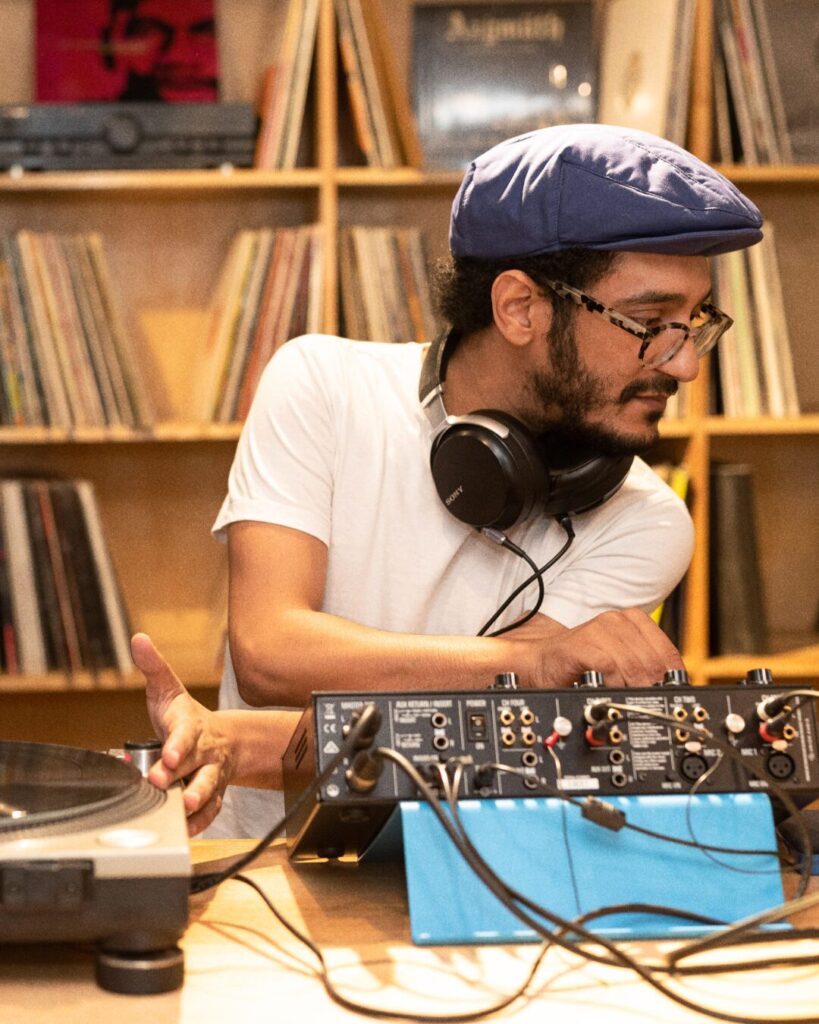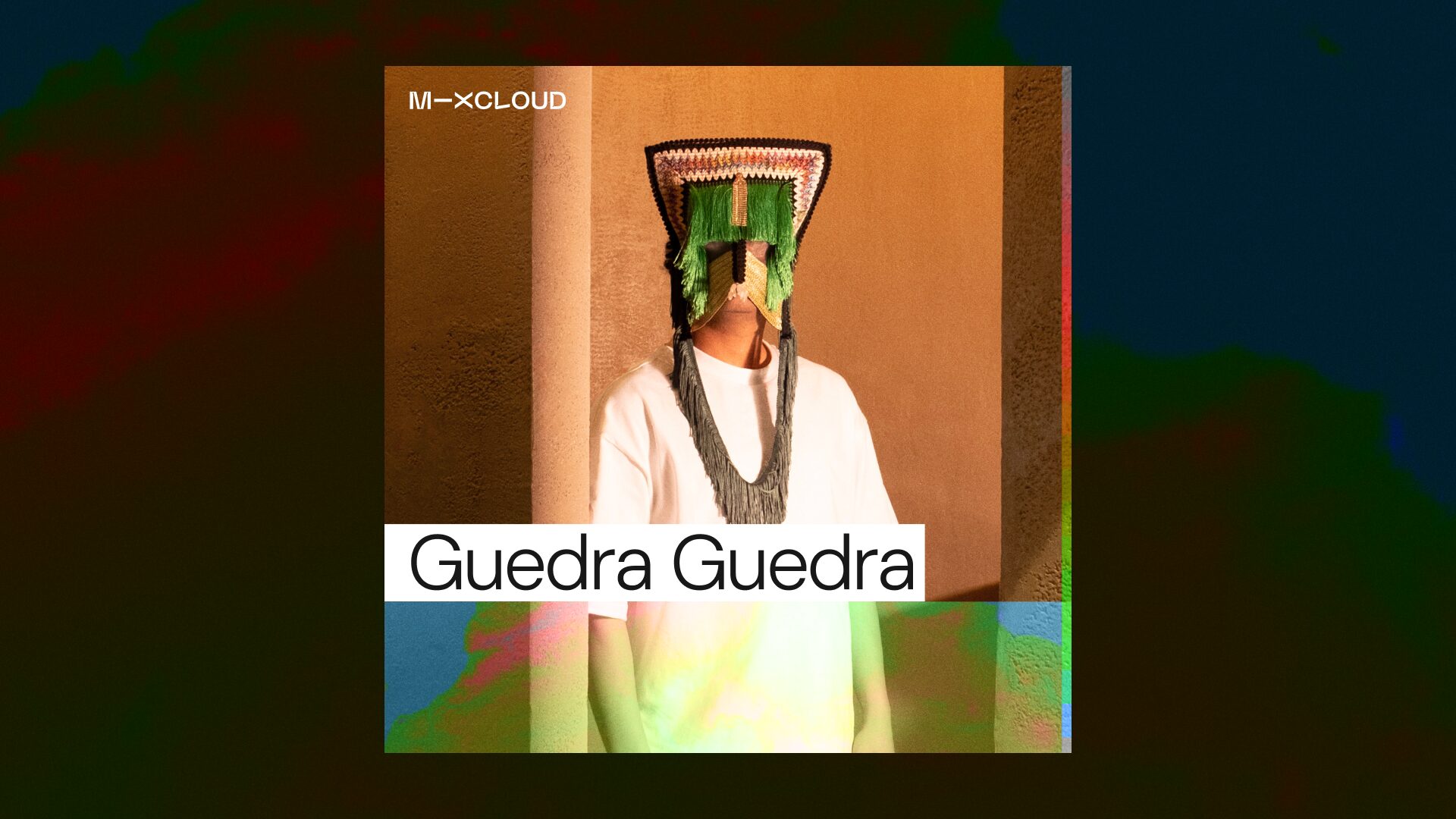To celebrate World Music Day, we’re spotlighting artists and DJs who are bridging musical generations, recentering forgotten sounds on the dancefloor, and reshaping how we hear the world. Those taking the sounds of the past and bringing them to the present and future through the lens of modern dance music. World Music Day continues to teach us that while music is being brought forward in new and imaginative ways, an appreciation of music’s past is ever present. Based in Morocco, Guedra Guedra brings ancestral music forward.
The DJ, producer and hybrid sound artist channels traditional sounds from across the continent and field recordings to deconstruct and rebuild rhythms while re-centering African musical narratives. As a result, he fuses contemporary dancefloor genres like UK Funky, Hardcore, Kuduro and Juke with melodies and vocal tones from West and North Africa for a truly unique finish. Anchored in this is his notion of ‘Future Music From The Past,’ a battle cry for the reimagination of traditional music. Having always been curious about his sonic surroundings and passionate about sound and music archives, Guedra Guedra has taken his talents far, performing at festivals throughout Europe.
We spoke to him about his reworking of rhythms, the importance of field recordings and why modern African artists are more connected than ever.
Contents
- 0.1 How did you get started as a musician and producer?
- 0.2 You strike me as just as much a music historian as you are a musician. Where do you think your curiosity for the sounds around you comes from?
- 0.3 You seek to explore the notion of tribalism in your music and merge more traditional African sounds, with field recordings a key component of your music. How do field recordings serve your mission?
- 0.4 Let’s talk about your concept of ‘Future Music From The Past’ – what kind of stories do you try to tell here?
- 0.5 Your approach to music encompasses much of the African continent. How do you negotiate and integrate such disparate influences in your music?
- 0.6 Your new album Mutant is releasing soon. What did you want to achieve with this new project?
- 0.7 How do you view modern African music? What are some of the scenes that excite you?
- 0.8 What keeps you inspired?
- 0.9 What are some of the proudest musical moments so far?
- 0.10 What does World Music Day mean to you?
- 0.11 Tell us about your World Music Day mix for Mixcloud.
- 1 Share this:
How did you get started as a musician and producer?
Guedra Guedra: I’ve always had a deep appreciation for music. At first when I was younger it was just as a listener but then I started collecting music and playing bass guitar and drums with different Rock and Metal bands. After I finished high school, I joined a school of engineering and I had very little time to rehearse and perform with bands. So I decided to start producing music from home. At the time, I was making more Ambient, Experimental stuff. But that’s how I started to develop my skills as a music producer.
I started to explore different kinds of music and collaborate with different artists around the world. I was lucky enough to be invited to work alongside galleries and theatres to create music for installations. That led to me creating a radio show where I invited people to talk about music. At the moment I find myself with a lot of field recordings from just exploring different places, and that’s how ‘Future Music From The Past’ came about.
You strike me as just as much a music historian as you are a musician. Where do you think your curiosity for the sounds around you comes from?
I don’t want to be confined to one kind of music. Everything I do musically is a way of expression. One day I can make bass-led Electronic stuff, the next day it could be Rock or Jazz. I don’t want to have limitations to anything I do creatively.
You seek to explore the notion of tribalism in your music and merge more traditional African sounds, with field recordings a key component of your music. How do field recordings serve your mission?
For me, Electronic music allows more freedom to be able to explore the past and present of sound. You have four-track rhythms but the possibility of what you can add in between is endless. In Africa, we have a lot of materials that can be captured via field recordings. We can use these materials and bring them into an Electronic environment that gives more possibility to speak a new musical language. Give them a new life. Being from Morocco, when I first started making music, trying to find unique sounds online was very difficult. I had to go out and record voices, movements and all kinds of rhythm. Now I see field recordings as a sound archive, capturing moments in time and adding them to the music.
Let’s talk about your concept of ‘Future Music From The Past’ – what kind of stories do you try to tell here?
I take rhythms from the past and bring them into the present by working them into Electronic music. It’s my way of showing that African sounds belong in the future of music. That we can forge new directions for African music. I harness music from North and Subsaharan Africa and bring them into the future using Electronic sound design and the latest technology of today. But I’m not making music with nostalgia in mind. I’m not trying to recreate the past. It’s more posing a question: what can ancestral music sound like in the future?
My field recordings can sometimes come from people talking or events such as ceremonies and weddings, and that strengthens the idea of music as resistance and as a tool to survive and connect. In this, we can find a hybrid identity for these recordings as well as ancestral rhythms, funneled through technology and machines. ‘Future Music From The Past’ is also about connecting generations, countries, continents and building bridges between the old and the digital.
Your approach to music encompasses much of the African continent. How do you negotiate and integrate such disparate influences in your music?
I don’t try to represent everything in my music but I do feel strong connections with many sides of Africa. Places like West Africa or other north African countries like Algeria. I’m always open to listening and learning and paying respect to other cultures and connecting them with others in respectful ways. I’ve travelled around the continent and worked with representatives of those sounds. As a result, I think my music can be seen as conversations between cultures. You can hear rhythm from Guinea, melody from Rwanda, percussion from Morocco. I let them speak to each other through my computer.
“Future Music From The Past is my way of showing that African sounds belong in the future of music.”
Your new album Mutant is releasing soon. What did you want to achieve with this new project?
I really wanted to go deeper into the idea of transformation of sounds, culture and rhythm. Music can mutate and cross borders and move forward and I wanted to show that. The opening track ‘Drift of Drummer’ is inspired by the Jambi rhythm which was pioneered by the Malinke people in Guinea, with its drum patterns. But I brought it into a new context through a drum machine and synthesizers, which reimagines what’s possible for a sound like that. I think it reflects the power of this rhythm as a force of movement and community bringing people together. Then you have a track like ‘Renegade’ and that is mixed with popular Moroccan violin music as well as Folk music from the Moroccan south. I hope people can feel the tension between past and future, and the reworking of tradition.
How do you view modern African music? What are some of the scenes that excite you?
I’m really happy and proud about what’s happening today. There are so many great artists from all of Africa that can make creative music but also resist and make something completely original. I know a lot of musicians from all over Africa and we all support each other, so there’s a camaraderie there. But there are infrastructural issues in the continent in that it can sometimes be hard to be able to travel from country to country to share your music. Sometimes I have to leave Africa to be able to travel to another African country via France or something. Hopefully this improves. But from Amapiano in South Africa to Chaabi in Egypt, I love it all. Africa is full of life, energy freedom and diversity and I’m glad so many voices are going in different directions.
What keeps you inspired?
My main source of inspiration is the world around me. The sounds of the everyday. Listening to people, listening to memories, learning about other musical cultures. I keep my recorder with me at all times to capture my thoughts and feelings. Working with other artists gives me a lot of inspiration too and brings me new ideas. I have a lot of records and I’m always digging, going to the market trying to find a rare treasure.
What are some of the proudest musical moments so far?
When I see people dancing to what I play, that’s when I’m the most proud. I can see people are happy, relating to the rhythms and moving to the beat. Even if they don’t understand the language or culture, rhythm is something that is universal. To be honest, I’m proud of every step in my life, even if it’s small. I believe that every moment is important in life and we have to be proud about it. Everything is a step towards something bigger.

What does World Music Day mean to you?
It’s a beautiful moment where we celebrate the true power of music. Where borders disappear and people can appreciate music of all kinds. No matter where you come from, what language you speak, your ideology, music brings us all together. It’s a time to share your story, culture and emotion. Create bridges between people.
Tell us about your World Music Day mix for Mixcloud.
I wanted to do something more personal and reflective to me and play records to soundtrack my everyday life. It could be just sitting in my house and cooking, or it could be a reference track that inspires me to create. This mix explores space in general, the space between a rhythm and silence and the textures that can come out of that.
